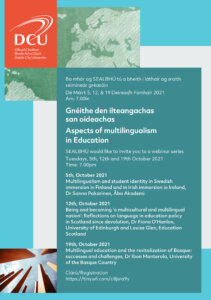Webinar series: Aspects of multilingualism in Education

18 10 2021

Registration
Gnéithe den ilteangachas san oideachas
Aspects of multilingualism in Education
All webinars 7.30pm (GMT +1 hour)
5.10.2021 Multilingualism and student identity in Swedish immersion in Finland and in Irish immersion in Irelan
Dr Sanna Pakarinen, Åbo Akademi, Finland
Swedish immersion education in Finland is known for its multilingual approach. The first part of the presentation covers the basics of second language, Swedish, acquisition and early access to foreign languages, e.g., English, French, and German, in an immersion programme for Finnish speakers in compulsory education (7–16-year-olds). The second part of the presentation explores (visual) multilingualism and student identity in Swedish immersion in Finland and in Irish immersion for English speakers in Ireland. What are the educational practices regarding multilingualism in the two immersion programmes? How do students reflect on their multiple languages? What does immersion student identity consist of? These are the questions I will discuss based on my doctoral research.
12.10.2021 Being and becoming ‘a multicultural and multilingual nation’: Reflections on language in education policy in Scotland since devolution
Dr Fiona O’Hanlon, University of Edinburgh and Louise Glen, Education Scotland
In this talk we will track the development of language in education policy in Scotland since devolution, exploring the provision for indigenous languages (such as Scottish Gaelic and Scots), community languages and modern languages in education over the last 20 years. The talk will first consider the development of Gaelic-medium education post-devolution, exploring the policy and practical factors that have facilitated and limited growth in this sector at the primary and secondary school stages, and considering the current and potential contribution of Gaelic-medium education to the maintenance of the Gaelic language in Scotland. We will then consider modern language provision in English-medium education, focusing on the 10-year implementation of the 1+2 languages strategy in Scotland, whereby, since Autumn 2021 all children in Scotland learn two modern languages at school in addition to English (learning the first modern language between the ages of 5-15 and the second from the ages of 10-15). We will explore the successes and challenges in relation to the implementation of this policy since 2011, and will consider the extent to which it is achieving its aims of creating a ‘norm for language learning in schools’ (2011) which supports Scotland to be and to become a ‘multicultural and multilingual nation’ (2012). We hope that parallels may be able to be drawn with Gaelic-medium education and modern language education in the Irish context for mutual discussion and learning.
19.10.2021 Multilingual education and the revitalization of Basque: Successes and challenges
Dr Ibon Manterola, University of the Basque Country
This talk will address the successes and challenges of the multilingual education of the Basque Autonomous Community (BAC), related to the revitalization process of Basque. After providing a general overview of the Basque revival process (1960-2020), the talk will focus on the evolution of the multilingual education system: the establishment of the A, B, D bilingual models, the role of English, the linguistic outcomes of students, teacher training needs, etc. In the final part of the session, a summary of the main successes and ongoing challenges will be offered: the endeavor will be to identify some of the key sociolinguistic as well as didactic factors that seem to influence the evolution of the BAC multilingual education and its impact on the Basque revival process.